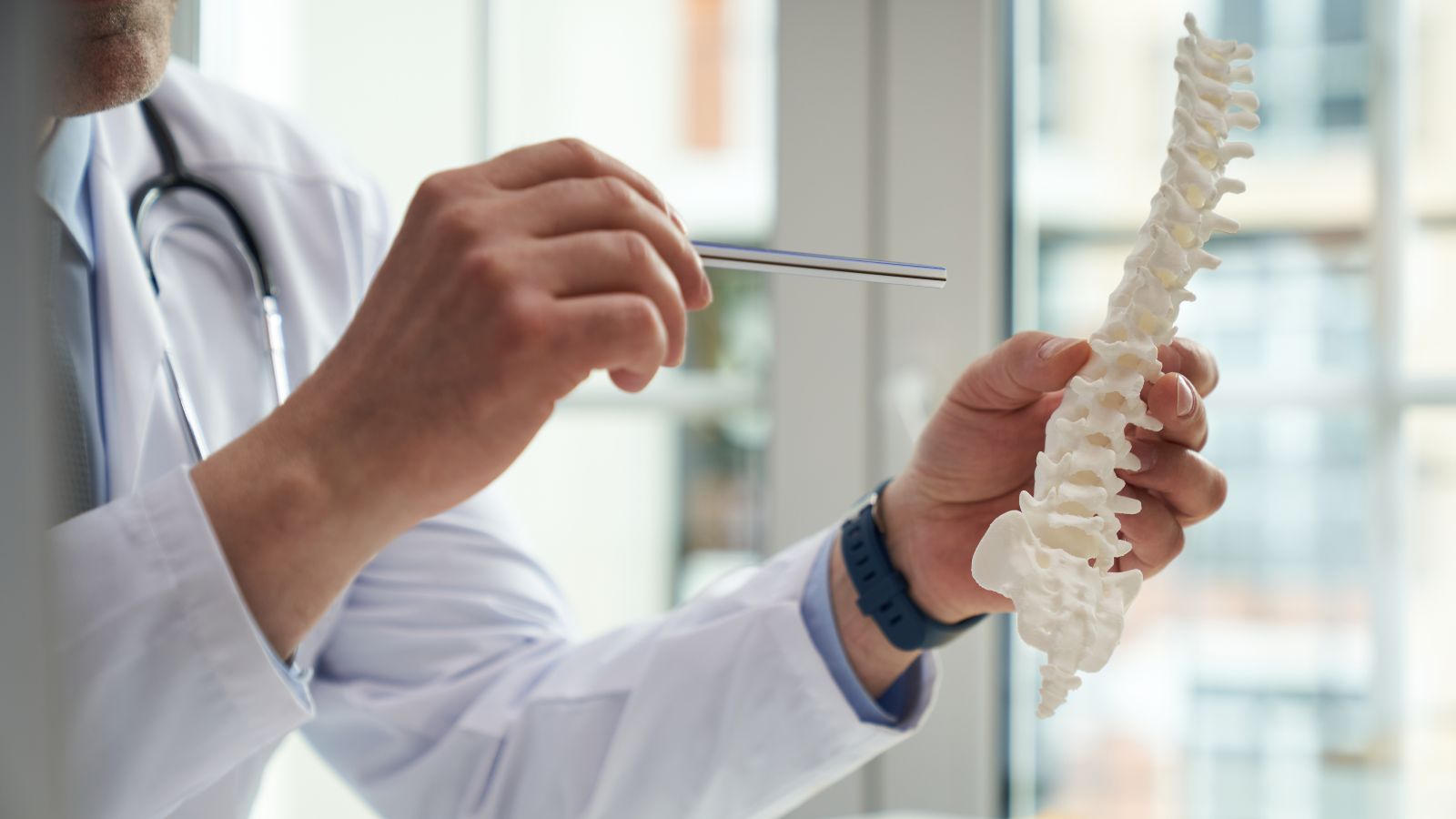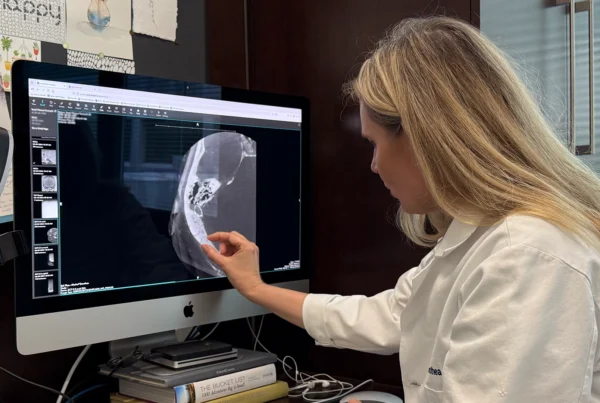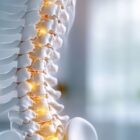Back pain can make everyday life hard. Simple things like getting out of bed or playing with your kids can become painful challenges. When you need spine surgery, knowing your options is key to getting better. At Neurosurgeons of New Jersey, we help patients choose between two common surgeries: spinal fusion and discectomy.
These surgeries fix different problems and have different recovery times. Your best choice depends on what’s causing your pain and what you want to do after surgery.
Spinal Fusion: Creating Stability in Your Spine
Spinal fusion joins two or more vertebrae (spine bones) together permanently. This stops movement between these bones. Think of it like turning a diseased and painful area into a strengthened, solid bridge.
How Fusion Works
Your surgeon may approach your spine from the front, back, or both sides. During surgery, they place bone graft material between your vertebrae. Over time, new bone grows and “welds” the vertebrae together.
To keep your spine stable while healing, surgeons often use:
- Titanium screws and rods to hold vertebrae in place
- Metal plates for immediate stability
- Special spacers to maintain proper disc height
When Fusion Might Be Right for You
Fusion may be recommended if you have:
- Spinal instability (vertebrae moving too much)
- Scoliosis (curved spine needing correction)
- Spondylolisthesis (one vertebra slipping forward over another)
- In some cases Degenerative disc disease (worn-out discs causing painful movement)
“My lower back and sciatic pain made even standing at my daughter’s soccer games impossible,” says Michael, a recent spinal fusion patient. “After trying non-surgical options, fusion gave me the stability I needed to return to an active lifestyle.”
Discectomy: Targeted Relief for Pinched Nerves
Discectomy removes all or part of a damaged disc pressing on nerve roots or your spinal cord. Unlike fusion, discectomy keeps movement between vertebrae.
Modern Techniques
Today’s discectomy options include:
- Microdiscectomy: Uses a microscope for greater precision and tiny incision
- Endoscopic discectomy: Uses small camera-guided tools for less tissue damage
When Discectomy Might Be Right for You
Discectomy may be recommended when you have:
- Herniated discs (disc material pushing out and pressing on nerves)
- Sciatica (mainly when caused by disc herniation)
- Radiculopathy (pain shooting down arms or legs)
It's time to get back
to doing what you love.
Fusion vs. Discectomy: How They Compare
Several factors affect which surgery might work better for you, your recovery, and long-term results.
Recovery Timeline
Discectomy:
- Less invasive with smaller incision
- Maintains spinal motion
- Most patients return to desk work in 1-2 weeks
- Full recovery typically in 4-6 weeks
- Many patients feel nerve pain relief right away
Spinal Fusion:
- Can also be done minimally invasively with small incisions
- More extensive surgery that does lead to some loss of motion
- Return to desk work possible in 4-6 weeks
- Full recovery and bone fusion take 3-6 months
- Results often develop gradually as fusion progresses
Possible Complications
All surgeries have some risks, but serious problems are rare. Understanding these risks helps you make better decisions about your care.
Discectomy:
- Approximately 10-20% of patients may have disc problems return over time
- There is a small chance that not all disc fragments are removed
- Rarely, nerve damage may occur
Spinal Fusion:
- Slightly higher risk of infection
- Possibility of incomplete bone fusion
- Hardware-related irritation
- Changes to nearby spine segments over time
Most of these complications can be treated if they happen.
Long-Term Results
Discectomy:
- Immediate nerve pressure relief
- Keeps natural movement
- May need more surgery if problems return
- Best for specific disc problems without instability
Spinal Fusion:
- Permanent stabilization
- Prevents further damage to the treated area
- May cause faster wear on nearby spine segments over the years
- Better for structural problems beyond simple disc herniation
Finding Your Best Option
The choice between discectomy and spinal fusion isn’t one-size-fits-all. Several personal factors affect what might be best for you.
Personal Factors That Matter
Age and Health: Younger patients often do better with motion-preserving procedures like discectomy when possible. Older patients with multiple spine problems might need the stability of fusion.
Activity Level and Goals: “I always look for the least invasive option for my patients,” explains Dr. Seth Grossman, Orthopedic Surgeon at Neurosurgeons of New Jersey. “My goal is to restore function and relieve pain, whether you’re a fitness instructor or someone with a desk job.”
Previous Treatments: Surgery is typically considered only after trying physical therapy, medication, and injections first.
Matching Surgery to Your Problem
The cause of your symptoms strongly influences surgical recommendations:
- Herniated discs without instability usually respond well to discectomy
- Degenerative disc disease with pain during movement may require fusion
- Spondylolisthesis often needs fusion to prevent further slippage
Life After Surgery
Your work demands matter in surgical planning:
- Physical labor, desk work, and driving each have different recovery needs
- Sports may resume sooner after discectomy
- Some flexibility-dependent activities might be permanently affected by fusion
The Importance of Surgeon Experience
Your surgeon’s expertise greatly impacts outcomes. At Neurosurgeons of New Jersey, our board-certified specialists offer:
- Fellowship training in complex spine procedures
- Experience with both traditional and minimally invasive techniques
- Personalized care plans for your specific needs
- Access to the latest surgical technologies
Questions to Ask During Your Consultation
To help decide between discectomy and fusion, consider asking:
- Which procedure best addresses the root cause of my symptoms?
- What specific recovery restrictions will I face with each option?
- How might each procedure affect my long-term spine health?
- What experience do you have with both procedures?
- Am I a candidate for minimally invasive approaches?
Your Next Step to Pain-Free Living
You don’t have to accept living with chronic back pain or nerve symptoms. Whether discectomy or spinal fusion is right for you depends on your diagnosis, goals, and circumstances.
At Neurosurgeons of New Jersey, we’re committed to helping you find the best treatment. Our spine specialists are available throughout New Jersey, including Ridgewood, Livingston, and Eatontown.
Ready to explore your options? Schedule a consultation today by calling 551-284-3265 or request an appointment online.

About Livingston
Our team of board certified physicians, located in Livingston, New Jersey, are dedicated to bringing you the latest developments and treatment options for spinal surgery. We strive to produce the most clarified & clear content to help you make informed decisions on your medical journey. The road to feeling like your true self should not feel lonely- Let us help you. Please call us to schedule a consultation and speak to one of our team members.






